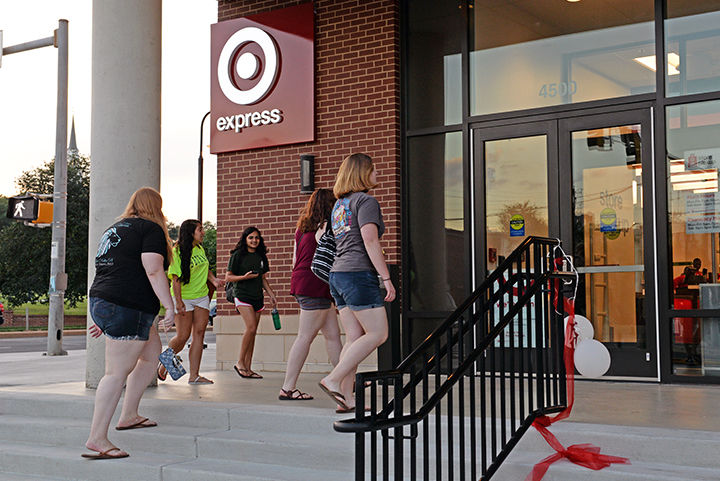
Shoppers converge on the entrance of the Target Express at the soft opening on July 21, 2015.
To a freshman wandering around a dining hall, finding food seems simple. Just hop in line and fill up on everything from hamburgers to soup and salad.
But incoming students might not realize moving to College Park means they’ll be living in a USDA “food desert” — a low-income area where a good portion of residents have little access to a grocery store or a place that sells healthy, affordable food.
As soon as sophomore year, students might find themselves struggling to fill their apartments’ fridge. The Shoppers supermarket on Cherry Hill Road is about 2 miles from the campus, but no Shuttle-UM runs directly there, so it’s difficult to get to without a car. Same with MOM’s Organic Market. Its healthier offerings are about 3 miles away, certainly not within immediate walking distance of campus.
And that’s the end of the tour. There are two full-service grocery stores within the city limits of College Park, population 31,274.
Engineering graduate student, Brian Moserowitz, shops at the Giant in Greenbelt.
“I wouldn’t be able to get there without my car,” he said. “Sophomore year, when I was still living in the dorms and didn’t have a car, I would take a Maryland shuttle to PG plaza, but it was a pain.”
Senior David Zhou, a computer science major, will have to ask for rides to get his groceries when school’s back in session.
“I usually bike to Shoppers on the weekends, but only because it’s summer, and the weather is nicer,” he said. “I couldn’t really see myself doing that throughout the semester. I would rely on others with cars.”
The Maryland Food Collective in Stamp helps provide fresh groceries to on-campus students. Worker-owner Chris Litchfield said the co-op used to carry more products but had to cut back its selection because of little demand. Now, they sell fresh fruits and vegetables directly from their kitchen stock.
“Next semester, we are going to formalize and expand this option, including posting produce lists and seasonal prices,” he said. “We want to help the community in the way we know best: providing quality, ethical food cheap enough so everyone can afford it.”
Litchfield said the co-op isn’t concerned about another grocery store moving in and taking their business.
“We try to avoid adversarial relationships with other businesses and rather seek to build collaborative networks to help the community,” he said.
College Park is often criticized for it’s less-than-vibrant neighborhoods and lack of a college-town feel — only 5 percent of the university’s faculty live in College Park. But both the university and the local government are working to change the tide.
The College Park City-University Partnership aims to make College Park a “thriving and sustainable University District” that is “safer and greener.”
In other words, a better college town, and one with more food.
The city “would welcome a grocery store,” Planning Director Terry Schum said. “Our residents would prefer to travel less to reach supermarkets.”
“The vision for greater College Park is to really bring more amenities, restaurants and other food options to campus and the community,” University Chief Communications Officer Crystal Brown said.
Progress is being made, though. This month, one of the nation’s first TargetExpress stores opened beneath the Landmark apartments on Route 1. The store will provide health and household products as well as a limited grocery section. The store held a soft opening July 21, with community stakeholders invited.
“There are times when you just want general groceries in your dorm room fridge,” sophomore Chris Keosian said. “The lack of grocery stores within walking distance really limits us to what the campus convenience stores sell.”
The government and politics major said he would appreciate the ease of more and closer options.
“A store within walking distance, like Target, would be super beneficial because it would keep me from having to drive to Giant or Shoppers and present an alternative to generally over-price stores like the 24 Hour Shop or Commons Shop,” Keosian said.
Brown said the university is excited to see the benefits of the TargetExpress. The city is also looking forward to the addition.
“It’ll be interesting to see what Target does to fill the need,” Schum said.
But materials science and engineering major Ethan Schindel doesn’t think it’s enough. The fifth year student currently depends on friends with cars to get his shopping done.
“The Target is a good idea, but it’s not a replacement for a grocery store” he said. “Give me a big store with lots of options.”
Planting a grocery store right next to the campus isn’t so simple, Schum said.
“A lot of students live in the community as well as in off-campus housing with brand new, shiny kitchens,” she said. But the arrival of a new grocery store is “market-driven” and so far “developers have been talking with Trader Joe’s and Wegman’s” but no definite plans have been made.
One bright spot is the new Whole Foods set to open later this year. But the victory is clouded by its distance from campus, located in Riverdale, just outside city limits.
Nonetheless, Schum is hopeful the store “will help fill the gap” in College Park’s all-too-apparent supermarket shortage.
CORRECTION: Due to an editing error, a previous version of this story referred to Chris Litchfield as a co-op owner. All co-op employees are worker-owners as part of its democratic philosophy. This story has been updated to reflect the correction.



